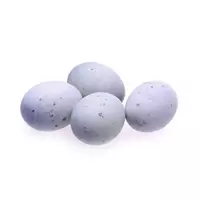Duck egg

In cooking, they have long used not only familiar chicken eggs, but also duck eggs. Duck egg differs from chicken in its size, as well as appearance. As a rule, a duck egg reaches a weight of 90 grams and can be distinguished by the original color of the shell. Often, in addition to white duck eggs, eggs of pale green color or with a bluish tint are found in nature. As a rule, domestic duck eggs are eaten.
This bird belongs to the Duck family and is cultivated by humans for a long period. Researchers believe the progenitor of the domestic duck is a wild duck or mallard. Currently, the largest share in the global breeding of domestic ducks is in China, where over 2 billion individuals are bred annually. Special types of ducks are bred not only in order to receive bird eggs. At all times, duck meat was especially popular and in demand, and not only due to its distinctive taste and consumer characteristics.
It is not unreasonably believed that duck meat is a healthy and nutritious food that must be present in the human diet. It is worth paying special attention to the chemical composition of duck eggs. As it turned out, the duck egg contains at least an amount of useful natural compounds, as well as vitamins. For example. the chemical composition of duck eggs contains a fairly large amount of vitamins of group A, as well as B, E, B and PP. Moreover, duck eggs are enriched with folic acid, which has a really favorable effect on the human body.
In addition to vitamins, the chicken egg contains such useful compounds and minerals as calcium, potassium, zinc, manganese, iron, choline, copper, sodium and magnesium. Add saturated fatty acids to the already listed useful natural compounds, which are contained in the chemical composition of duck eggs and an incredibly healthy and at the same time nutritious food product. It should be especially emphasized that the calorie level of a duck egg exceeds the indicators of a chicken product.
Currently, duck eggs can be purchased directly from breeder farmers or from specialized stores. Most often, duck egg is used in the process of making pastries and bakery products. Duck eggs are much better than chicken eggs for making biscuits and rolls. it's all about the buttery structure of duck egg protein, which contains far more fat than a chicken product. Duck eggs give biscuits a more delicate consistency. However, culinary masters argue that chicken eggs are better suited for making meringue or other desserts.
Also, a duck egg loses to its chicken rival to taste fried. True, boiled duck eggs are considered an excellent addition to salads. Duck eggs occupy a special place in the Asian culinary tradition, since on the basis of the product you can make a national dish of most Asian countries - noodles. An important difference between duck eggs and other varieties is that the product contains more fats in its chemical composition.
In China, for a long time, a delicacy has been made from duck eggs, which is called the "thousand-year-old or imperial egg. " The duck egg will be stirred for about 100 days in a water solution, to which tea, burnt oak bark, as well as salt and patash are added. As a result, the duck egg protein changes its color to black, and the yolk turns green.
duck eggs 185 kCal
Energy value of duck egg (Ratio of proteins, fats, carbohydrates - ju):
Proteins: 12.81 g (~ 51 kCal)
Fats: 13.77 g (~ 124 kCal)
Carbohydrates: 1.45g (~ 6kCal)
Energy ratio (bj | y): 28% | 67% | 3%
 Español
Español Français
Français Português
Português Русский
Русский 简体中文
简体中文 繁體中文
繁體中文 日本語
日本語 한국어
한국어 العربية
العربية Türkçe
Türkçe Қазақ
Қазақ Deutsch
Deutsch Italiano
Italiano Українська
Українська
